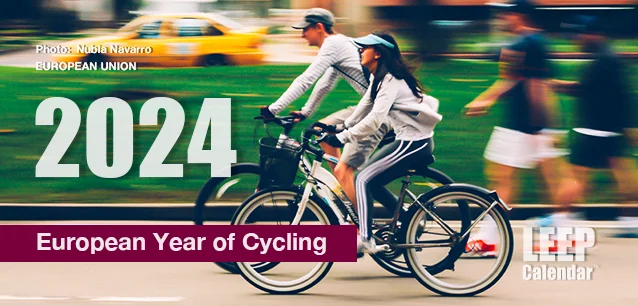 AD
AD
Today is: December 04
Scroll to explore events active on this date.
Additional Events on LEEP
LEEP INK FEATURES

August? Absolutely!
In August, we live through the Dog Days of Summer. It's hot and often humid, and those who can leave for better climates do. Down south, winter is in full force. August is also known as "the ...

In The Heat of July: July 2025 Events
Is it hot enough (or cold enough if you're below the equator) for you yet? There is actually a day for that! Like every month, I pick a diverse collection of events you may or may not know about. This ...

May Blooms: Events in May 2025
Along with October, May is one of the most densely packed months of the year. It's before the summer humidity and the last whole month of the school year. The weather is warming in t...
About the European Year of Cycling
Travel & Tourism , United Kingdom & Ireland
European Countries , Eastern Europe
Ends: Dec 31, 2024
DESCRIPTION:
The ECF recently wrote to European Commission President Ursula von der Leyen a letter signed by 33 members, asking her to designate 2024 as the European Year of Cycling. Attaining a designation by the Commission ensures additional funds and regionwide coordination exists. The European Cycling Federation can declare the year independently as a recognized organization. As of this writing, they're seeking additional support from the whole of the European Union for the event.
Europe is on the brink of becoming a continent where cycling is a significant transportation mode, not just in a few places. Numerous EU countries are adopting national cycling strategies, municipalities are improving cycling infrastructure, and Europeans are cycling billions of kilometers yearly. More businesses are utilizing cargo bikes for deliveries.
The 2024 European Year of Cycling could be the spark to encourage millions of Europeans to cycle. Europe needs cycling more than ever. One hundred cities are pledging to be climate-neutral by 2030. New EU policies are projected to urge European cities toward Sustainable Urban Mobility Plans to reduce transport sector carbon emissions. The goals of the European Green Deal can only be met with more Europeans, particularly in cities, cycling instead of driving. Cycling is vital to European history and culture. Celebrating it can make it accessible to all.
What's a European Year?
It's a public awareness campaign on a particular issue to spark debate and dialogue among EU nations. It allows EU institutions to highlight a subject relevant to all EU countries and citizens, aiming to educate and alter attitudes.
The Commission suggests the theme, usually during the State of the Union address by the Commission President. The European Parliament and EU member state governments debate and finally adopt it.
Many European Years provide extra funding for local, regional, and national projects related to the theme. It sends a potent political message that the theme should receive additional attention in policymaking.
VIDEOS
SUPPORTING DOCUMENTS
Currently, this event does not have supporting documents.
ADDITIONAL IMAGES
Currently, this event does not have supporting images.
Where would you like to go now?
 AD
AD


/footer-logo.svg)
